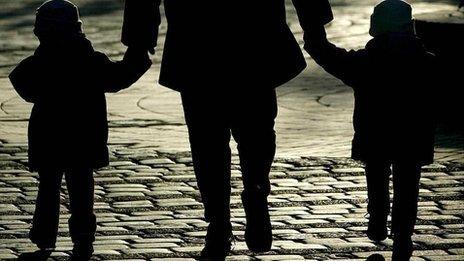Child welfare 'named person' plans questioned by MSPs
- Published

Every child in Scotland would be appointed a 'named person' from birth under new legislation
Government plans to provide every child in Scotland with a "named person" have been questioned by MSPs.
Under legislation set out in the Children and Young People Bill, every child would be assigned a named person, such as a health worker, from birth.
The adult would be responsible for safeguarding the child's welfare.
MSPs from Holyrood's Public Petitions Committee pressed Children's Minister Aileen Campbell on how such a measure would work in practice.
SNP MSP John Wilson asked how children would be made aware that they had a named person, and how that named person would be identified to the child.
"How do we make sure that this named person is actually identified to the young person, and the young person has the confidence and the ability to actually directly speak to that named individual?" he said.
'Huge enterprise'
Labour's Anne McTaggart asked: "Have you got quotas as to how many (children and young people) that named person will have?
"In my last job within social work, there were cases there of up to 70, so that named person may well have up to 70 young people under their jurisdiction."
Conservative MSP Jackson Carlaw suggested the measure is "a very huge enterprise".
"How many named persons do you anticipate there will be? What will the turnover be in named persons? And how in practice does that really establish a bond of confidence on which people feel they can rely?" he asked.
Ms Campbell was appearing at the committee to give evidence for its inquiry into child sexual exploitation.
Child-centred
She said the responsibility for providing a named person will belong to health boards until the child reached the age of five, when she or he would be transferred to local authorities.
Part of the implementation of the Bill involves the drafting of regulations and guidance on the expectations and responsibilities of named persons, she said.
"Certainly the idea, as has been said, is about trying to cut through bureaucracy to make sure the child truly is at the centre of the services that are being delivered around them," Ms Campbell said.
"It is important to realise that while there will be a named person for every child, not every child will need interaction with that named person.
"There has to be a way in which we can make sure that there is someone having an overview of what is happening to that child, to make sure that the early indicators of anything that would pose a threat or risk to that child are flagged up as soon as they can be."
- Published18 April 2013